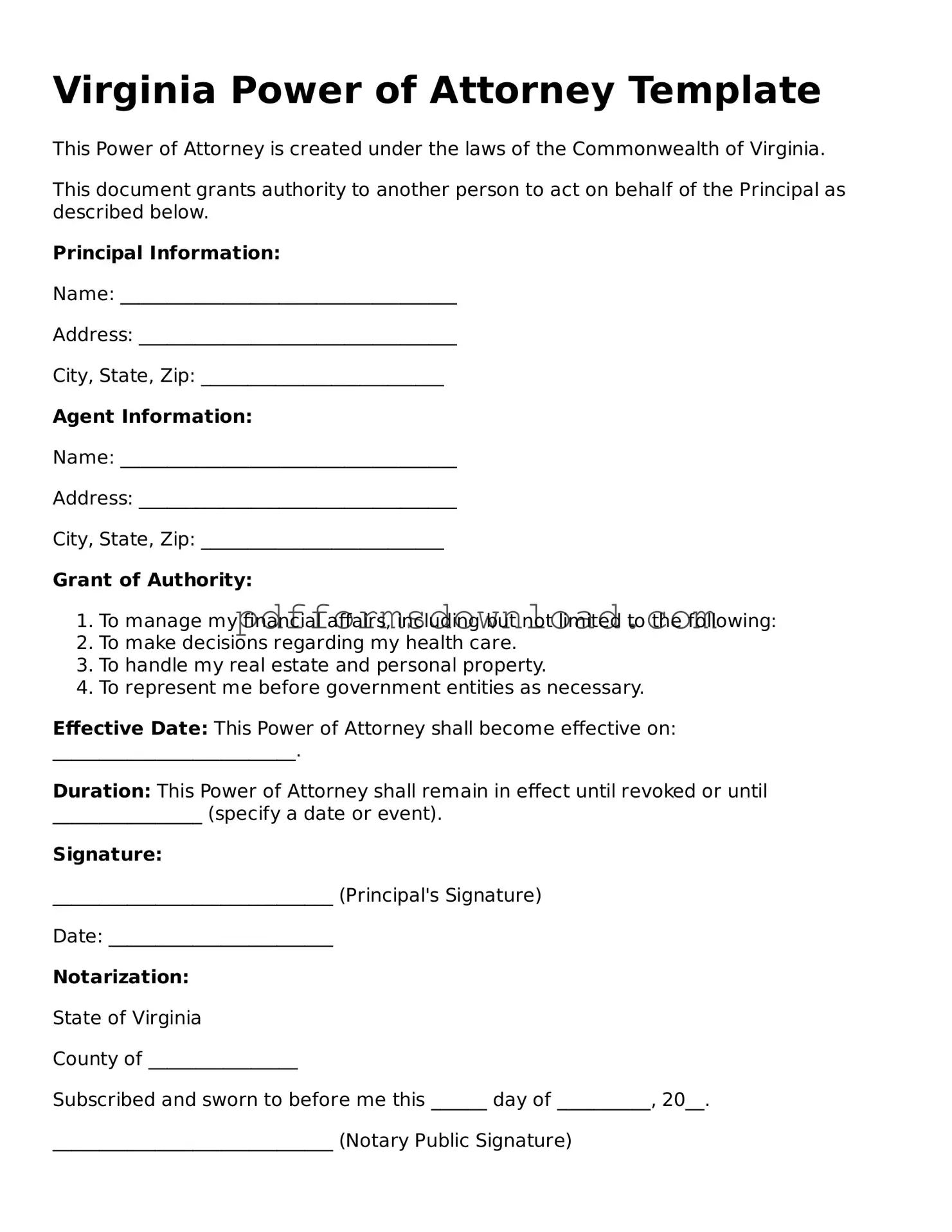What is a Power of Attorney in Virginia?
A Power of Attorney (POA) in Virginia is a legal document that allows one person, known as the principal, to grant another person, referred to as the agent or attorney-in-fact, the authority to make decisions on their behalf. This can include managing financial matters, making healthcare decisions, or handling real estate transactions. The principal must be of sound mind when creating this document, ensuring that they understand the powers they are granting.
What types of Power of Attorney are available in Virginia?
Virginia recognizes several types of Power of Attorney forms, each serving different purposes. The most common types include the General Power of Attorney, which grants broad powers to the agent; the Limited Power of Attorney, which restricts the agent's authority to specific tasks; and the Medical Power of Attorney, which allows the agent to make healthcare decisions if the principal is unable to do so. Additionally, a Durable Power of Attorney remains effective even if the principal becomes incapacitated, while a Non-Durable Power of Attorney ceases to be valid under such circumstances.
How do I create a Power of Attorney in Virginia?
To create a Power of Attorney in Virginia, the principal must complete a form that outlines the powers being granted. This form must be signed by the principal in the presence of a notary public. While it is not legally required to have witnesses, having them can provide additional protection against potential disputes. It is advisable to keep copies of the signed document in a safe place and to provide copies to the agent and any relevant institutions, such as banks or healthcare providers.
Can I revoke a Power of Attorney in Virginia?
Yes, a Power of Attorney can be revoked at any time as long as the principal is mentally competent. To revoke the POA, the principal should create a written revocation document, sign it, and notify the agent and any institutions that may have relied on the original document. It is important to ensure that the revocation is clear and unequivocal to avoid any confusion about the agent's authority.
What happens if the principal becomes incapacitated?
If the principal becomes incapacitated, a Durable Power of Attorney remains effective, allowing the agent to continue making decisions on the principal's behalf. However, if a Non-Durable Power of Attorney was created, it would terminate upon the principal's incapacity. It is crucial for individuals to consider their needs and preferences when selecting the type of Power of Attorney, especially in regard to future health concerns.
What responsibilities does an agent have under a Power of Attorney?
The agent has a fiduciary duty to act in the best interests of the principal. This means they must manage the principal's affairs responsibly and ethically, avoiding any conflicts of interest. The agent should keep accurate records of all transactions and decisions made on behalf of the principal. If the agent fails to fulfill these responsibilities, they may be held legally accountable for any resulting damages.
Can an agent be compensated for their services?
In Virginia, an agent may be compensated for their services if the Power of Attorney document explicitly states that compensation is allowed. If the document is silent on this issue, the agent is generally expected to act without payment. However, they may be reimbursed for reasonable expenses incurred while carrying out their duties. It's advisable for both the principal and the agent to discuss and clarify any compensation arrangements before the POA is executed.
Is it necessary to have a lawyer to create a Power of Attorney in Virginia?
While it is not legally required to have a lawyer to create a Power of Attorney in Virginia, consulting with one can be beneficial. A legal professional can help ensure that the document complies with state laws, accurately reflects the principal's wishes, and addresses any specific concerns. For individuals with complex financial or medical situations, seeking legal advice is often a prudent step to avoid future complications.

